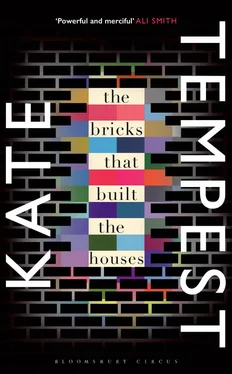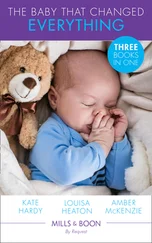In the early spring of that year, Paula Shogovitch fell pregnant. At first, she was convinced that she would continue working through her pregnancy, and that having a baby did not necessarily mean she would have to put her camera down. John assured her that he would support her in whatever decisions she made, but as the pregnancy progressed, it became clear to Paula that John, whether he knew it or not, had no intention of making any sacrifices when it came to his schedule. She felt, in some gnawing part of her mind, that he viewed his work as a purpose, and her work as a hobby. She started saying no to the odd assignment, taking on less until the word got around, and as she grew heavier and more exhausted she stopped walking the streets hunting the hidden moments that she had made her name capturing. She felt too conspicuous for it now. She began to photograph her own body, at home, but found this uninspiring. A growing belly in a bedroom mirror didn’t speak to her as loudly as a mounted policeman chasing two prepubescent football fans down a tiny alley, scarves wrapped around their heads, clutching fireworks.
It was a gradual process, learning what it meant to be a woman. Her boyfriend had no time really for her despondency. He tried to buoy her up, telling her that she was sure to get back to work when the baby arrived. ‘You can take lots of pictures when the baby’s born, when you push the pram around.’ He didn’t mean to condescend, but he had no grasp on what was slipping out of Paula’s reach. She sat for hours with her swelling bump, resigning herself to a new life. She felt guilty for every stab of jealousy she felt in the face of his burgeoning career; she knew that he was trying to make the world a better place, and that he suffered for it terribly. But it made no difference when she was stuck at home that long, hot summer; uncomfortable and bored and lonely, while he was manic with his work, and drunk at night when he came home.
Winter laid her solemn hands across the city and stroked all the colours out of the sky. The pavement was wet and cold outside the maternity ward. She named her daughter Rebecca, after her favourite aunt, who had been a poet and a tennis player, and England’s first female locksmith.
Paula held her baby in her arms and understood the meaning of life. Rebecca had John’s serious oak-dark eyes, and Paula could see her mother in the shape of Rebecca’s mouth. She passed the baby to John who held her and stared down into her pudgy face, aware that he had found something he didn’t know he lacked. The love was immediate and more profound than any he had known. In that moment, while Paula, exhausted from the birth, watched her boyfriend with their baby, she entertained a thousand quick-fire fantasies of how their lives might play out, the three of them, together. John, meanwhile, was watching his daughter’s tiny hands, feeling only the urgency to keep pushing himself onwards in his work so that he could improve things for her. His fantasies were of political success and the building of a brighter future.
John’s career was blossoming. His book was well received in the press, and wildly popular, selling tens of thousands of copies in its first months, which was a lot for a political science book. He was celebrated by those on the Left, ridiculed by those on the Right, and was sneered at by politicians who saw his approach as unorthodox and flash-in-the-pan. He was unmarried, living with his girlfriend and their baby. He was seen as a man with questionable morals. He was determined his success would be based on his ideas and his policies, and not on his personal life — or on the version of himself that he was expected to sell to the press — but that determination made him an easy target. He refused to fall in line or scrub up or blend in, he was vitriolic about Westminster. His message was clear: things have to change, we are in a state of emergency! He didn’t want to be another baggy-mouthed puppet in the popularity contest, lined up against the wall before the press like it was execution day.
He kept going, touring the country in a beaten-up van, sleeping in the back on a half-frozen mattress in supermarket car parks. Driving through the night, guts ruined from motorway burgers and cheap, thick whisky. He was out to make a difference. He couldn’t bear what was happening to the world. To his country. It was just a question of information, he was sure. People just had to know and that would be a start. Instead of smashing up the football stadiums, we could be smashing up the institutions that were keeping us in this misery. If people just knew that what was happening was not the only option, and even if it was, know that it wasn’t right .
He was sick of seeing the people pitted against each other, black against white and north against south, and so many were dying and poor, beaten up, demonised and kept in a state of dejection. He couldn’t rest, not for a moment. He could see so clearly what the government and the multinational corporations were doing: enslaving the country in the name of freedom and getting away with it. He was teaching the brightest students he’d ever taught; they were coming in droves to politics. It was a time of great upheaval and chance and chaos and pain.
He was going about things the only way he could trust. Grass roots. Driving all day to talk with a hundred hungry young men who couldn’t find work, and then driving all night back to London to teach his classes in the morning. He went to the people, with no cameras, and no story to sell. He put himself in front of single mothers, office workers, immigrants and prisoners and talked and listened, and it gave them hope.
While John toured the country and passed out exhausted to snatch a few hours’ fitful sleep on the floor of his university office, Paula and Becky lived in the flat and spent their days together. The weed didn’t grow on the balcony now. They had to cut the precious plants down for fear of the press or arrest. There was a lot that Paula couldn’t do any more; she couldn’t gossip with her neighbours in her dressing gown, or go out dancing with her girlfriends. She couldn’t sit topless in the sunshine on her balcony. Their lives were not their lives, they belonged to John’s job and to the looming shadow of potential public disfavour.
But she could watch her daughter and feel the surge and peace of motherhood. She watched the fingers grow, the toes, the legs, the tiny eyelashes. My baby is growing . All things repeated this. I have a child. She is a girl . Paula would pick up her camera occasionally, turn it over in her hands, change the shutter speed, raise it to her eye and look through it, but each time, before she could decide on a shot, the baby would be hungry, or need her attention, and the camera would feel like an indulgence. The notion of ‘making it’ seemed so trivial. What was important was Becky being occupied, happy, warm. Becky learning words. Becky painting. Becky’s hunger, Becky’s thirst, Becky sleeping well. The fury of her creative pursuits belonged to a different person. She often thought about it, intensely, while doing the endless cleaning up, washing of clothes, changing of nappies, cooking of food; did she miss it? She couldn’t honestly say that she did.
John would come home at nights with a deep, furrowed brow. He seemed emptied of something. He barely noticed the things Paula would do. Little things in the home to make it feel brighter when he got back. He ate and he smiled and he touched her, but he wasn’t there.
In 1992 John Darke was thirty-eight and had become a formidable force in public opinion. The negativity that he was lambasted with by the establishment only served to prove to his followers that he was committed to change. There were societies set up at the universities to discuss his ways of thinking, leagues of his followers gathered in pubs and cafés across the country and, as the local election loomed, he stood outside the shopping centre, without placards or leaflets, at a table, answering people’s questions. The media hated him, the government hated him, but the people loved him and so he was dangerous. Dangerous John fought on. He expressed himself with the clarity of someone who was telling the truth. The general consensus was that John Darke was about to do something no one had ever seen done. And the feeling was everywhere.
Читать дальше












